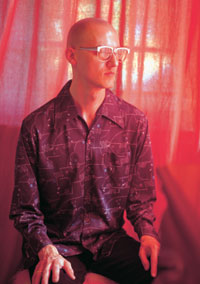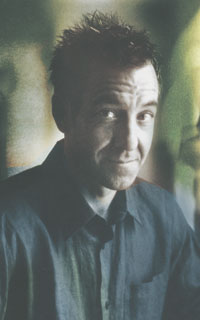25 NEW FACES OF INDEPENDENT FILM
 |
| PHOTO: MARIO DE LOPEZ |
When Erik Deutschman – who works for the L.A.-based commercial production house Duck Soup – says that his films are "effects heavy," he’s not talking about overloading his work with the latest flashy plug-ins. "I like to use old-school techniques," he clarifies, "like in-camera multiple exposures, exposing directly on the negative, optical illusions and stop-motion animation."
Those who caught a glimpse of this year’s Sundance trailers, which Deutschman designed, have an idea of what he means. Never mind that Robert Redford, balking at the unusual soundscapes the filmmaker had slaved over and cut to sync with his oddball animations, ordered up some "ill-fitting" substitute music cues: Deutschman’s Dada-inflected promos shined anyway.
Influenced by a diverse roster of cine-originals – from stop-motion masters Jan Svankmajer and the Brothers Quay to live-action fantasists Nicolas Roeg and Federico Fellini – Deutschman’s films merge Cronenberg’s body horror and Duchamp’s proto—Op art roto-reliefs. Split, his 1999 short film about a guy who escapes his body with a bit of alien assistance, was a festival favorite and a regular on the Sundance Channel for the past two years. It moved modern horror icon Clive Barker to dub it "a startling original vision."
The director’s Web site, ("much in need of an update," Deutschman needlessly worries) provides an overview of his past works and future aspirations but stops short of detailing his latest script, The Last Bridge. A "progressive sci-fi feature" without dialogue, the film details the travails of the last man on earth, a lonely fellow with a "moving-image recording device that helps him comprehend the world’s pre-apocalyptic past." – Chuck Stephens
[contact: erikd@lanset.com or www.divinesparkproductions.com]
 |
| PHOTO: JOJO WHILDEN |
Filmmaker’s innate modesty and some sense of journalistic propriety prevents us from heralding in these pages the considerable cinematic achievements of the various folks on our masthead. So when managing editor Mike Jones optioned EvenHand, a terse screenplay about South Texas cops to Cypress Films for Joseph Pierson (Cherry) to direct, we mumbled congratulations and then went back to proofing the latest issue.
We paid a little more attention when Jones finished Miller, which he calls "a South Texas Death of a Salesman but without the death" and attached Chris Cooper to star, but mostly we worried about making our FedEx deadline to the printer.
But now that Jones, 30, has left Filmmaker, signed with AMG and is working on a flurry of projects, both studio and indie, it would be downright churlish of us not to include him in our annual survey of 25 New Faces. Not only has EvenHand finished production (with Bill Sage starring and George Washington maestro Tim Orr shooting), but Academy-Award winner Marcia Gay Harden has committed to Miller, which Jones plans to direct.
Jones also has two high-profile writing gigs under his belt. He did the production rewrite of Matt Dillon’s directorial debut, Beneath the Banyan Trees, which recently wrapped shooting in Cambodia with Dillon, Gérard Depardieu and Stellan Skarsgard starring. And he is currently penning Automata, an "underground robot Fight Club," for Stan Winston Productions and Columbia Pictures after selling them on his original pitch.
Jones attracted the interest of Dillon, Columbia and AMG not with some amped-up Bruckheimer-style spec, but with the Miller screenplay, a quietly moving character study reminiscent of John Sayles’s work. Says Jones, "Most scripts that I read lack interesting characters. Whether you love or hate a protagonist, you first have to want to follow him. The character of Miller is a conflicted one, but that’s what both Matt and Columbia both responded to and wanted to see [in their projects]."
Jones attributes his realistic view toward character and his facility with dialogue to his South Texas upbringing. "People don’t talk in monologues there," he observes. "They speak with a stuttering cadence, a lot of body language and with a high degree of subtlety."
Although Jones hopes to direct Miller himself in the fall, he hasn’t done too much planning beyond that. "This has all happened so quickly," he says. "I’m still trying to figure it all out." – Scott Macaulay
[contact: mike@filmmag.com or Lindsay Williams, manager, AMG (310) 860-8000]
 |
| PHOTO: JONATHAN TAYLOR |
When cinematographer Nicholas Hay moved from London to Los Angeles in the early 1990s, first impressions of the place weren’t exactly movie-related, even if the spectacle of destruction he encountered did have a major impact on his career. "Shortly after I got here," he recalls, "the Rodney King trial ended and the riots happened. I had come from a politically involved family, so just looking at what was going on around me made me want to learn as much as I could about California politics. Then I got interested in the prison systems and rates of incarceration, and those are the kinds of issues I’ve been concerned with ever since."
A refreshing sensibility, particularly coming from a guy who makes the bulk of his living shooting commercials. "But I’m always looking for a refuge from all of that," Hay says, "a way to get to the other end of the filmmaking business as often as I can." So when Hay’s agent, Judy Marks, brought him the script for director Jordan Melamid’s Manic – about the emotionally turbulent experiences of teenagers in a mental facility – Hay found exactly the sort of socially-conscious, milieu-specific feature project he’d been looking for. Shot on the Sony PD150 PAL digital camera, the frenetic and sometimes sun-blanched Manic takes its visual cues less from a desire to make video look like film, than from an interest in the yellows of Vincent Van Gogh’s paintings, and motion studies of early Wong Kar-wai. "When you work in video, you’re not supposed to point the camera at very bright backgrounds, or to shoot out of windows that are five or six stops brighter than your exposure, but I thought it gave the film an interesting look. For the most part, I only used direct and bounce lighting, and kept the exposure in the middle all the time so that I’d have something to play with in the transfer that would give us a saturated and slightly disintegrated image."
Though still working in commercials, Hay’s main focus at the moment are documentaries: Juvies, with director Leslie Neale, about juvenile offenders being, tried as adults; an as-yet-untitled project about a recovery program for people involved in gang activity in Northern California; and a third that he’s planning to direct himself. "It’s about Alex Sanchez," Hay explains, "a guy who started a reform and recovery project that introduces hardcore gangbangers to sculpture and painting." Fiction features continue to beckon (he’s received three or four offers since Manic), but his sense of social purpose always wins out. "Mainly," he says, "I’m looking for the most vital way to live as possible in the predominantly commercial world that surrounds me all the time." – Chuck Stephens
[contact: sectionc@earthlink.net or Judy Marks, (323) 461-3555]
David Von Ancken — director
For all of its bitstreams and downloads, the Web has produced very few filmmaking stars. Sure, there’s the guy that made that frog-in-a-blender thing. And then there’s the Blair Witch guys, except that their stars were hitched more by the $100-million gross of their film rather than their canny Internet site.
One person, however, who may be on his way to notoriety, if not stardom, through the Web is David Von Ancken, who won Hypnotic’s Million Dollar Film Festival with his digital short, Bullet in the Brain. Streamed as original content on the Hypnotic site (www.hypnotic.com), Bullet in the Brain was one of five films selected for the contest’s final round by Web surfers. Then, a five-member jury, including directors Jay Roach and Jonathan Mostow, selected von Ancken as the winner by considering not only the short but his feature film proposal. Von Ancken’s prize? One million dollars of production funding from Universal Pictures for his first feature.
For the New York-based Von Ancken, 37, the prize caps off 14 years kicking around the city’s production scene.
Working as everything from p.a. to director on numerous shorts, PSA’s and music videos, Von Ancken has studied acting at the Actor’s Studio and has also sold original photographs to national magazines such as G.Q. and Details. In 1998 he made a short film, Box Suite, which screened at several regional film festivals. Later that year he acquired rights to Tobias Wolff’s short story, "Bullet in the Brain," with the plan to turn it into a film. Casting Tom Noonan, the writer/director/star of What Happened Was… and The Wife and well known for numerous character roles in films like Heat and Manhunter, Von Ancken found the perfect cinematic form for Wolff’s elegant prose. The story of a embittered college literature professor and his moments-before-dying thoughts as he is shot during a bank robbery, Von Ancken uses Noonan’s off-key performance and Peter Konczal’s distinctive cinematography to create a surprisingly insightful look at how the creative impulse can guide one’s life. – Scott Macaulay
[contact: Pat Dollard, Propaganda Management, (323) 802-6811]
 |
| PHOTO: LUIGI DEBIASSE |
For an aspiring young Hollywood actor whose most visible career accomplishments so far include a small role on an episode of Sabrina, the Teenage Witch and a commercial for the office supply giant Staples, David Fickas has some heady no-tions about win-ning his first Academy Award. He’s already made his first attempt, with a silent (or at least speechless) black-and-white homage to the innocence of early cinema’s one-reelers, called The Silent Story.
"We shot it in two days on digital video," says Fickas – a polymathic upstart for whom acting seems mainly a distraction from his central passions of writing and directing – "then blew it up to 35mm and rented the Silent Movie Theater in West Hollywood for the premiere, which made it eligible for the Oscars."
The Silent Movie didn’t take home the trophy for which it was intended, but it did win a Yahoo! Internet Life Online Film Festival Award and added to the already snowballing underground reputation that Fickas and his production company, Drama 3/4, have been developing over the past couple of years.
Fickas’s ambitious and eccentric feature debut – a quasi—science fiction/conspiracy flick called The Basement and the Kitchen that was shot mostly in 1997, finished in 1999 and, Fickas says, "sold in 2001, we hope" – is his crowning achievement thus far. Constructed as two interlocking halves, it concerns a teenage kid (played by Fickas) who lives in the basement of his mother’s house and never ventures out, convinced that upstairs a vast conspiracy of government agents are plotting to steal his secret powers and destroy his mind. As it happens, he’s right.
Now signed to a two-picture writing/directing/acting deal with Matador Films, Fickas’s next feature is tentatively entitled Love Me Weird. "It’s about two New York theater actors who create a musical about a Jeffrey Dahmer—like serial killer, something along the lines of "Springtime for Hitler" in Mel Brooks’s The Producers. Kind of a cross between One Flew over the Cuckoo’s Nest," Fickas laughs, "and my personal experiences as a stage actor." How’s that for Oscar bait? – Chuck Stephens
[contact: Drama 3/4 Productions (323) 935-6366 or Lauren Lloyd. manager (310) 244-7399]
VOD CALENDAR


 See the VOD Calendar →
See the VOD Calendar →


